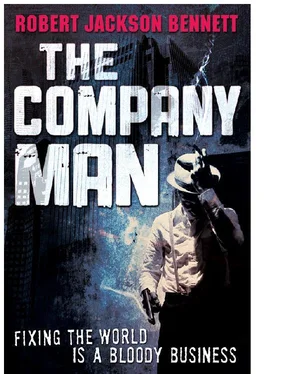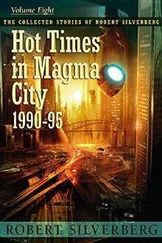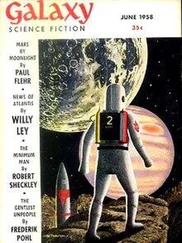Robert Bennett - The Company Man
Здесь есть возможность читать онлайн «Robert Bennett - The Company Man» весь текст электронной книги совершенно бесплатно (целиком полную версию без сокращений). В некоторых случаях можно слушать аудио, скачать через торрент в формате fb2 и присутствует краткое содержание. Жанр: Триллер, на английском языке. Описание произведения, (предисловие) а так же отзывы посетителей доступны на портале библиотеки ЛибКат.
- Название:The Company Man
- Автор:
- Жанр:
- Год:неизвестен
- ISBN:нет данных
- Рейтинг книги:3 / 5. Голосов: 1
-
Избранное:Добавить в избранное
- Отзывы:
-
Ваша оценка:
- 60
- 1
- 2
- 3
- 4
- 5
The Company Man: краткое содержание, описание и аннотация
Предлагаем к чтению аннотацию, описание, краткое содержание или предисловие (зависит от того, что написал сам автор книги «The Company Man»). Если вы не нашли необходимую информацию о книге — напишите в комментариях, мы постараемся отыскать её.
The Company Man — читать онлайн бесплатно полную книгу (весь текст) целиком
Ниже представлен текст книги, разбитый по страницам. Система сохранения места последней прочитанной страницы, позволяет с удобством читать онлайн бесплатно книгу «The Company Man», без необходимости каждый раз заново искать на чём Вы остановились. Поставьте закладку, и сможете в любой момент перейти на страницу, на которой закончили чтение.
Интервал:
Закладка:
“What was what?” asked Kulahee.
“That thing you used. What was that?”
“Oh,” he said. “It’s just a pump I made. A little hand pump.”
“I’ve never seen a pump like that,” McNaughton said.
Kulahee nodded, not paying attention.
“You say you made it?” McNaughton asked.
“Yeah,” he said. “It takes the creek water. Not from the creek. But below it. Took me a bit to figure out how. But I did it. I make a lot of things,” he added.
“A lot of things?”
“Yeah.”
“What sort of things?” asked McNaughton.
“I don’t know. Things that do different things.”
“Like what, though?”
Kulahee turned and looked at him. Then he said, “All sorts of things. You… you want to see them?”
“Yes,” said McNaughton. “Yes, I really would.”
Once the day’s work was done Kulahee led McNaughton to his shed. There he showed him about a half-dozen other inventions of his, each staggeringly complex. There was one device that used a series of old lenses and mirrors to take the light from a candle and magnify it to illuminate an entire room with a clean, strong radiance. Another purified water, using a series of tiny rotating screens to filter out all manner of silts and then channel them into little concentric piles. And there was another that was just a fat, black egg, set in a glass dome with three small pipes running from its base.
“What does that do?” asked McNaughton.
“Gets hot,” said Kulahee.
“Hot?”
“Yeah. Gets hot whenever there’s a thunderstorm in, oh, say, three miles of here. Gets burning hot.” He scratched his nose and said, “I use it to boil water. Make coffee.”
McNaughton stared at it, then reached out to feel its radiance.
The future was born not in Paris or New York or Rome. It was born in a shed at five o’clock in the evening with two muddy men and a handful of mice as its only witnesses. Within a month McNaughton was sharing ten patent rights with Mr. Kulahee, who likely had no idea what he was signing away, and the McNaughton Western Foundry Corporation was scratched out on paper before Christmas.
McNaughton’s venture began to pick up immediately, its first product being a streamlined version of Kulahee’s hand pump. It was lighter, able to pull water from the worst wells, and through Kulahee’s strange mechanical genius it did it all with a minimum of effort, amplifying force many times over. It seemed to pluck water from the very air, one journalist said. It was an enormous success, and the McNaughton Corporation skyrocketed. The company followed it up with a type of steam engine McNaughton himself suggested, taking Kulahee’s understanding of mechanics from the pump and applying it to locomotion. This new model took much more refining, as Kulahee had never planned for his designs to be implemented on such a large scale, but at the end of their work they produced an adapted, faster form of locomotive that needed a quarter of the coal to run. By the time they introduced the conduits, those strange steam generators that ran purely off the discharge from nearby electrical storms, McNaughton was one of the foremost industrial barons in the world.
One thing struck McNaughton’s investors as strange, however: upon forming the company, McNaughton refused to move the base of business away from the small fishing settlement where Kulahee had built his home. It would have been an easy thing to take the creations and Mr. Kulahee’s valued mind back to San Francisco, where he could import resources, or even east to Seattle, which was a burgeoning city at the time, but McNaughton insisted that business come to him. Exactly why became a much-argued point. Some said Kulahee refused to move, forcing McNaughton to cater to the eccentric genius’s rudimentary needs. Others said McNaughton wanted to become a strong voice in forming Washington’s nascent statehood when it came to commerce, which he did. And still more claimed that Mr. Kulahee insisted he could do his work only when he was in a little cave far down in the valley, a place where he could go and meditate and allow himself to think. Perhaps it was there that Kulahee first dreamed up his famous airships, which would open up the skies to humanity at the turn of the century.
But no one could verify this. Both Kulahee and his designs quickly became almost fanatically protected company secrets. As patents became established the workings of any McNaughton product would naturally become known, but as for where the ideas came from and the research methods and principles that Kulahee had almost absentmindedly developed, those became mysteries from the McNaughton Corporation’s inception. Many took issue with it, but McNaughton was well protected. Not only did it often buy out its most vocal critics, but Washington state laws defended the company on every side, and as the corporation grew to become the powerhouse of the American economy it became protected on the national level as well. Generous military grants helped secure friends in all branches of government, and later it was generally agreed that if America had not threatened to become involved in Europe with McNaughton weapons at the vanguard then the entire German Crisis might have never been averted.
Evesden soon became an industrial city on a level never before witnessed. It sprawled out almost exponentially, with new neighborhoods and housing developments appearing overnight. Its growth was unaccountably messy, as blocks and streets and tangles of alleys were sporadically flung down and paved over. In some of the newer sections a rare street grid was enforced almost as an afterthought, but beyond a few blocks it always devolved into the usual snarl of pathways, splitting and curling away like bursting fireworks. The city lacked a genuine downtown section as well, choosing instead to absorb nearby townships and integrate them into its sprawl, and so Newton and Westbank and Lynn and Infield became neighborhoods trapped in the depths of the city, each with its own identity and customs.
But while the city planning left much to be desired, the city itself became a wonder of the world. Evesden was a place where the amazing became mundane, it was said. There towering cradles stood watch over the skyline, each a delicate, spider-spun array of cables and struts that embraced the shining gold airships that would come drifting down from the sky as though in a dream. Throughout the city, electric lamps bathed the streets in a soft white glow. Automobiles, a rarity in the rest of the world, choked the roads in places. On cold days the moisture from the shore would mix with the fumes from the plants, layering the thin, winding streets in a thick fog, and as you walked along one lane you would sometimes see a factory emerging from the curl of the clouds ahead, bejeweled with harsh blue lamps and covered in countless spires, like the deck of a ghost ship drifting mere yards away. And down below the city the underground trolley tunnels shuttled passengers from one end of Evesden to the other in minutes, sometimes even passing under the ocean itself.
But it was said that the trolleys were just the beginning, and that like icebergs only the tip of Evesden could be seen and the rest was far below, somewhere deep in the earth, even below the trolley lines. While it was true that McNaughton facilities were mostly underground, some said there were passages and chambers far below that the public never knew of, places where enormous machines did strange things for secret purposes, working day and night. Many Evesdeners testified that in certain places in the city you could hear a slow, soft pounding echoing up storm drains and sewers like some distant heart. Some even claimed there were words in it, a low voice speaking in the darkness in an unknown tongue, and indeed some clans of the homeless would perch around the deep vents and try to interpret its sounds, though this was universally regarded as madness.
Читать дальшеИнтервал:
Закладка:
Похожие книги на «The Company Man»
Представляем Вашему вниманию похожие книги на «The Company Man» списком для выбора. Мы отобрали схожую по названию и смыслу литературу в надежде предоставить читателям больше вариантов отыскать новые, интересные, ещё непрочитанные произведения.
Обсуждение, отзывы о книге «The Company Man» и просто собственные мнения читателей. Оставьте ваши комментарии, напишите, что Вы думаете о произведении, его смысле или главных героях. Укажите что конкретно понравилось, а что нет, и почему Вы так считаете.












